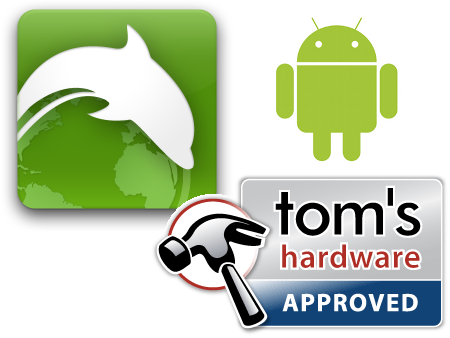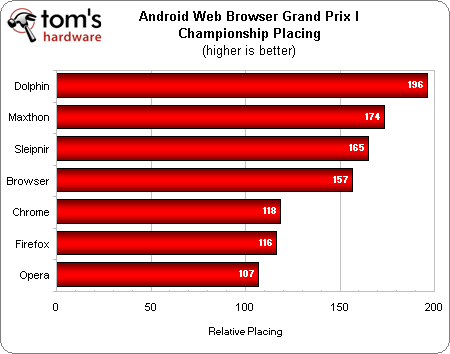Which Web Browser Should You Run On Your Android Device?
Today is our very first Web Browser Grand Prix on Android. Unlike iOS, Android-based tablets have real competition between browsers. So, how do Chrome, Dolphin, Firefox, Maxthon, Opera Mobile, and Sleipnir stack up against the stock Android browser?
Final Placing And The Android Winner's Circle
And the award goes to...
Dolphin!
Maxthon, Sleipnir, and the stock Android browser round out the top four spots. Chrome places a distant fifth, with Firefox just two points behind in sixth place. Opera Mobile winds up in last place, nine points behind Firefox.
Interestingly, the big-three desktop browsers, Chrome, Firefox, and Opera, all finish after second-string desktop brands and mobile-only browsers. Chrome underperforms in some basic areas where the Android browser excels, yet shines in the newer technologies where Android's browser definitely does not.
It makes sense that Google waited so long to release Chrome for Android, and why it was not immediately made the platform default. By the time Chrome becomes all that the Android browser is currently (and more), the transition should be seamless.
We're definitely bummed to see Firefox and Opera do so poorly, but Firefox for Android is still relatively new, and version 12 is a big disappointment for Opera on all platforms.
Browsing on an Android Tablet Versus the iPad
Get Tom's Hardware's best news and in-depth reviews, straight to your inbox.
Since the test suite had to be further pared down to accommodate the Android browsers, we re-tabulated the iOS results from last month using only the tests ran here today. In order to do this, we removed all CSS and HWA tests, Asteroids, BrowserMark (which has since undergone a major upgrade), and everything from GUIMark except for the Text Columns test.
| Placing | Asus Transformer TF300T | iPad (third-gen) |
|---|---|---|
| 1st | Dolphin w/Jetpack: 129 pts | Safari: 133 pts |
| 2nd | Maxthon: 117 pts | Maxthon: 96 pts |
| 3rd | Sleipnir: 115 pts | Dolphin: 92 pts |
| 4th | Stock Android Browser: 110 pts | Chrome: 90 pts |
| 5th | Chrome: 125 pts | Axis and Sleipnir: 89 pts |
| 6th | Firefox: 109 pts | N/A |
| 7th | Opera Mobile: 92 pts | N/A |
Asus' Transformer was launched at a comparable price point as the iPad, though its specs are somewhat different. While Safari's point total is higher than anything available for Android, it's interesting that nearly every browser on Android beats the other iOS-based contenders. The App Store's restrictive approach to third-party browsers is definitely a bad thing for iOS users. By restricting other companies to the old stock Safari engines, Apple is really doing those developers a disservice.
But don't let the results of this article determine your next tablet purchase. Outside of Web browsing, the difference between the two platforms is night and day. We found that the Transformer regularly crashed and bogged down with more than five or so apps open in the background. Meanwhile, none of that happened on the iPad. Benchmarks that wouldn't run on the iPad...well, they simply wouldn't run. In Android, they'll crash your browser. Throw in a lack of tablet-optimized apps in Google Play, and the situation only looks worse.
For the record, I do not own any Apple products other than the Magic Trackpad and a few copies of OS X. And while I do use an LG Android-based phone, Asus' Transformer gave me my first long-term experience on an Android tablet. The past two months were also my first using an iPad.
As an avid Linux user on the PC, I really wanted to like Android. Hardware-wise, I actually like the Transformer better than the iPad 3. Ironically, its cheap plastic construction makes it lighter and easier to grip. The problem is that, unlike in the smartphone space, Android still isn't on par with iOS for tablets.
The Closed-Door Future
When you take the App Store's rules into account (and now Microsoft's IE10-only advantage on Windows RT), the Android platform is the only fair game in town. The other two venues only host rigged events. We'll regularly be checking in on Web browser performance on Google's mobile operating system because, fortunately for consumers and developers, it actually matters here.
Current page: Final Placing And The Android Winner's Circle
Prev Page Standards Conformance-
mayankleoboy1 "Stock Android Browser" is a myth. There is NO "Stock" android browser.Reply
Each device manufacturer (Samsung, Asus, Lg, HTC) customise/modify the "stock" browser to match the SoC, the TDP, power saving, and specific browser benchmark targeted, for that device.
So this "Stock" browser is actually a modified browser, customised by ASUS to work better with a Tegra3 SoC, in some specifc benchmarks which Asus thinks are more important than others. Its not a representative of all android devices. -
mayankleoboy1 Sunspider and Kraken are crap benchmarks. All browsers target these benchmarks for specifc optimisations, that are never actually used on the web.Reply -
aznshinobi Reply9539316 said:"Stock Android Browser" is a myth. There is NO "Stock" android browser.
Each device manufacturer (Samsung, Asus, Lg, HTC) customise/modify the "stock" browser to match the SoC, the TDP, power saving, and specific browser benchmark targeted, for that device.
So this "Stock" browser is actually a modified browser, customised by ASUS to work better with a Tegra3 SoC, in some specifc benchmarks which Asus thinks are more important than others. Its not a representative of all android devices.
When you're running a Nexus device, it's a stock browser... -
adamovera mayankleoboy1Sunspider and Kraken are crap benchmarks. All browsers target these benchmarks for specifc optimisations, that are never actually used on the web.SunSpider is the next to go for sure, but I haven't heard a ton of criticism regarding Kraken yet. Between BrowserMark, Peacekeeper, and RIABench, we could withdraw all the vendor-developed JS tests.Reply -
tiret ^ interesting. lets hope it works out... my gf is rather pissed that she can't play farmville on my galaxy tab.Reply -
fwupow I've already figured out that Chrome isn't so hot, but the reason why Chrome still wins for me is that it synchronizes bookmarks, passwords, history and a bunch of other stuff across all my computers and devices. That is an indispensable feature for me.Reply -
wildkitten tiretgive me a browser with flash support then we'll talkSince Adobe themselves has ended Flash development for all mobile platforms, I don't think you will see many browsers keeping support for it for long. Likely in a year, maybe 18 months, you won't see any support for Flash as, well, what's the point.Reply -
Firefox Beta has flash support once you download and install the flash apk - I have it working well on my Nexus 7Reply

